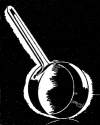 In 1888 they produced 50
pounds of aluminum to be sold at $2.00 a pound. In 1890 the first
aluminum cooking utensil was made. Today something like 400 million
pieces of aluminum ware have been made.
In 1888 they produced 50
pounds of aluminum to be sold at $2.00 a pound. In 1890 the first
aluminum cooking utensil was made. Today something like 400 million
pieces of aluminum ware have been made.Charles Hall did not discover aluminum, he did something that was probably more important, he made it commercially available. It is no longer a precious metal, it is a commercial material that has thousands of everyday uses - from thimbles to airplane wings. When we read of a thousand airplanes today we are reading of thousands of tons of aluminum, a far cry from the few pellets in Hall's hand 58 years ago! Down in the Severance Chemical Laboratory is an aluminum statue of Charles Hall, nearby is a large photograph of Frank Jewett - pupil and teacher - boy and man. Jewett did not make the discovery but, I believe, he was of great help to Hall. That combination has a striking parallel in many of the things we do today - the guiding hand of Experience coupled with the fire and enthusiasm of Youth. In the new world of tomorrow that lies just over the horizon, we shall, as never before, need both. ● |








